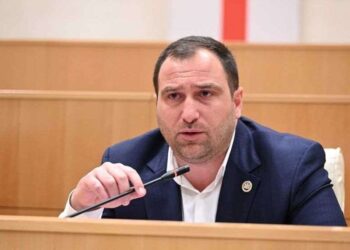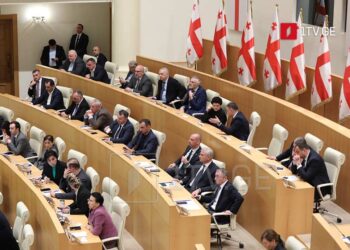The Minister of Foreign Affairs of the Federal Republic of Germany, Annalena Baerbock, paid a two-day official visit to Georgia last week.
“I came to Georgia with a specific message,” she noted. “We want to see Georgia in the European Union, we want Georgians to enrich the European Union. We will support you on this path. We are very happy that you have made significant progress, especially in terms of the implementation of the 12 priorities, as well as in terms of the follow-up process. There are 12 priorities to gain candidate status. This is the most important task for all of us. Naturally, it is necessary to work together. In the accession process, the supremacy of the law, and implementation of democratic standards are necessary.”
She noted that now the task of politics is to overcome polarization, restore trust and implement reforms with full conviction.
“The Government of Georgia cannot become a member of the European Union without civil society, and civil society cannot become a member of the European Union without the government of Georgia. It is only possible united,” Baerbock added.
The President of Georgia discussed the issues related to the European integration of Georgia with Ms Baerbock during her stay.
President Zurabishvili stated at the meeting held in the Orbeliani Palace that the population of Georgia will not understand a second refusal of candidate status, and will consider itself abandoned by Europe.
“That is why I am here, and this is what my government supports. Georgia needs to continue reforms to get the candidate status,” Baerbock said.
Steps made toward those 12 points this week
“If Europe and MEPs want to end polarization, they should grant Georgia candidate status – this will remove questions and speculations and end their [the opposition’s] destructive, radical actions, the extremist opposition will have no real reason to accuse our government,” Georgian Prime Minister Irakli Garibashvili said in his speech at the plenary session of Parliament.
He claimed that the priority set for Georgia to get candidate status is to end polarization, but the question is what the opposition is doing to this end.
The Parliament heard the Foreign Affairs Minister, Ilia Darchiashvili, answering the questions of the Opposition MPs Teona Akubardia, Tariel Nakaidze, Ana Natsvlishvili, Giorgi Vashadze, Paata Manjgaladze, Khatuna Samnidze, and David Bakradze at the plenary session.
“The geopolitical context that the international community and Georgia encounter today is becoming ever more complex and severe. The international community is still consolidated in support of Ukraine due to the Russian military aggression, which poses the acutest challenges to the common security architecture, and within this situation, our country has to implement all foreign goals and tasks outlined and promised to the Georgian population. Despite these challenges, we are keeping to the steady implementation of the tasks necessary for our successful EU integration,” the Minister reported, noting that the EU analytical report on the approximation of the Georgian legislation with the EU laws promulgated in February and the positive assessment provided therein reaffirm that Georgia does deserve EU candidacy.
“I hope the EU will make the respective political decision after the Parliament successfully accomplishes compliance with the EU recommendations. With full responsibility, I declare that the Georgian Government, in close cooperation with the Foreign Ministry and active collaboration with Parliament, takes further steps to ensure the positive positioning of our country in the next report, as it had in the analytical report of the European Commission,” Darchiashvili stated.
“We address the compliance with the 12 priorities with the merit-based principle and, when conversing with our European colleagues, we request that the decision be based on the progress achieved by Georgia and the outcomes of the implementation of the EU recommendations that our country manifests in the EU approximation process in general.”
Georgian Parliament endorsed the State Concept of Economic Empowerment of Women with 78 votes this week, being among the priorities determined by the Georgia-EU association agenda.
The concept defines the following directions: 1. Equal access to economic resources; 2. Enhancing the gender-sensitive legal framework; 3. Improvement of public sector procurement and employment practices; 4. Improvement of employment practices in the private sector; 5. Recognition, reduction, and distribution of unpaid and care work; 6. Encouraging the formalization of economic activities of women employed in the shadow economy; 7. Struggle with contradictory social norms.
The concept was signed by representatives of the parliamentary majority and members of the opposition political group.
The Committee discussed the Draft Law on Money Laundering and Facilitation of Elimination of Financing of Terrorism, binding the accountable persons to reflect the risks of money laundering and financing of terrorism related to their activity; establishing stricter scopes of restriction of the application of the law on accountable persons; introducing a new record allowing the accountable person to terminate the preventive remedies and notify the Financial Monitoring Service; and determining the authority of the FMS to conduct the operational and strategic analysis.
As FMS Head, Valerian Khasashvili noted, the Draft ensures the consideration of the MONEYVAL recommendations on money laundering and, as a result, increases the rating of estimation of certain recommendations.
Chair of the Committee, Maka Botchorishvili noted that fulfillment of the recommendations is important for Georgia in yet another direction.
“Georgia has submitted the application for accession to the Single Euro Payments Area (SEPA) and the fulfillment of MONEYVAL recommendations is set out as a precondition. Hence, the legal amendments can be realized in this direction as well,” she said.
Chairman of Georgian Dream, Irakli Kobakhidze, spoke about the fulfillment of the EU’s 12 points and noted that it is their obligation to fulfill these points, adding that two draft laws remain to be adopted, and everything else has been done. Kobakhidze emphasized that all this was done without the participation of the radical opposition, with their unilateral responsibility.
“We will bring this process to the end. Two more draft laws need to be adopted and these will be fulfilled in due time, and the adoption of all relevant laws will be completed by the end of June. There are no political prisoners in Georgia, and therefore this issue is not related to us in any way. What the European Parliament says has no value,” Kobakhidze said.

Opposition on the implementation of the 12 recommendations
The party ‘For Georgia’ this week called on the ruling team to start the second, real stage of parliamentary work for the implementation of the EU’s 12 recommendations in parliament, within the framework of which, with the participation of the opposition, a parliamentary supervisory board for the implementation of the 12 recommendations should be created, and the recommendations of the Venice Commission should be implemented on at least three issues, namely – justice, elections and in the direction of anti-corruption reform.
“The party For Georgia has never been a cause of polarization in the process of implementing the 12 recommendations,” representatives claimed in a statement. “Unlike some opposition parties, which conducted a parallel process, we participated in the parliamentary working groups, and presented a concrete plan for the actual implementation of the 12 points, which is directly in line with the recommendations of the Venice Commission.
“Is clear that as a result of the attempted adoption of Russian law, the authorities caused irreparable damage to the country’s international reputation.
“The perception in our partners that the Ruling Party has taken deliberate anti-Georgian, anti-national steps, is confirmed.
“In response to this situation, we call on the Government to start the 2nd, real phase of parliamentary work aimed at the substantive implementation of 12 points, leaving no room for political fraud.
“It is crucial: First, we call on both the Ruling Party and Opposition, parliamentary opposition parties, independent MPs to share responsibility and conduct the process jointly.
“It will be possible to implement the first recommendation and reduce polarization. Within the scope of unified responsibility – to create a Parliamentary Supervisory Board for the implementation of recommendations. This board would be tasked with ensuring the effective implementation of evaluation and monitoring mechanisms proposed by the European Commission. Through collaborative efforts with the Commission, the board would facilitate regular reporting on the progress made towards recommendations.
“Second: In the agenda of the second round, the recommendations of the Venice Commission on at least three issues should be fully taken into account:
1. Justice system – fundamental reform of the High Council of Justice;
2. Electoral reform – unified, full-fledged, including considering all previous recommendations;
3. Reform of the anti-corruption agency – systemic reform of the regulatory framework, equipping agency with investigative function.
“Also, the issue of deoligarchization, according to a systemic approach, not individual.
“Third: To ensure the involvement of public and political entities, the working process should be conducted according to the rules of procedure of the Parliament, through clearly regulated mechanisms. We also appeal to international partners to increase pressure on the authorities to implement the 12 points,” the For Georgia statement read.
The members of the Reform Group held a meeting with the PACE Monitoring Committee to deliberate on compliance with the EU recommendations for the EU candidacy for Georgia and the political processes in Georgia.
Chair of the Group, Khatuna Samnidze, noted that the fulfillment of the recommendations is not enough, that Georgia needs to demonstrate to its European partners that the political processes in the country are being conducted in the European way and line with European values.
“We overviewed the political statements, the Russian Law, and the attacks in the Parliament; we underlined that despite such a grave milieu, we are for and appeal to our partners for EU candidacy since it is an opportunity for our country to progress and be safeguarded from Russian aggression,” she noted.
Group member Giorgi Vashadze added that the opposition spares no efforts to ensure Georgia receives EU candidacy, though the chances are being reduced.
“Despite the authorities of Georgia applying the mechanism characteristic for Russian disinformation, attacking our European partners and colleagues in Parliament, despite the daily physical reprisals and failure of the government to comply with the EU recommendations, the Georgian people have proved they deserve the EU candidacy,” he stated.
Charles Michel: By end of the year, Council should decide on the accession of Moldova, Ukraine and Georgia to the EU
Charles Michel, President of the European Council visited Moldova and made a statement, noting the European Commission should publish the next report regarding the EU accession process, which concerns the European perspective for Moldova, Ukraine, and Georgia, as well as the Western Balkans.
“I intend to raise this issue before the European Council by the end of the year. This means that by the end of the year, the Council must decide on the issue of starting the process of accession negotiations with these countries. This will be a political decision, taking into account the report that the European Commission will prepare. I sincerely hope that a positive decision will be possible by the end of the year,” Michel stated.
Compiled by Ketevan Skhirtladze














